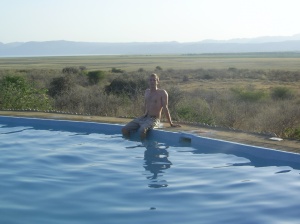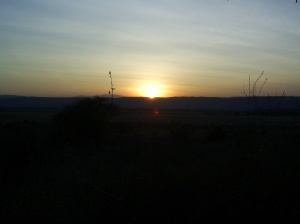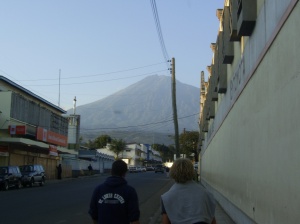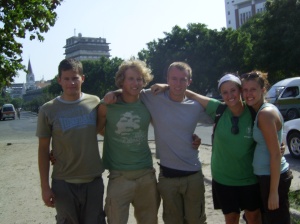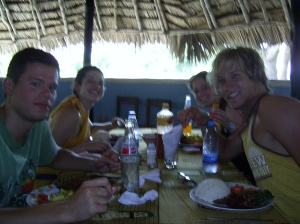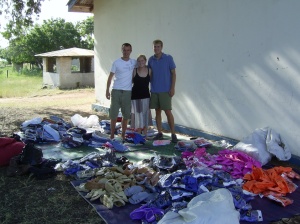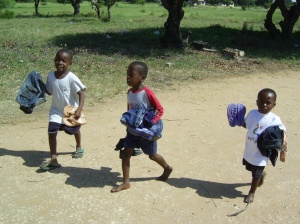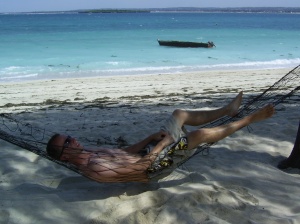Today I was up at 6:30 to watch the sunrise from the wooden balcony of our tented lodge. Unfortunately there wasn’t a great deal to see of the sun due to cloud cover, but the Great Rift Valley and Lake Manyara were just as beautiful this morning at dawn as they were last night at dusk. I awoke feeling refreshed from a good night’s sleep, although I do recall hearing some foreign noises during the night. Steve also thinks he heard noises, more specifically the sound of elephants. The maasai guards later informed us that during the night a herd of elephants had indeed passed by just a few feet behind the lodge and a pride of lions just a few feet in front. It’s exciting to think that we are so far into the wilderness that wild animals pass freely during the night; but equally disconcerting when you consider that only a few weeks ago a British tourist won compensation in a Kenyan court after having her pelvis crushed and kidney destroyed by an elephant at a similar safari lodge not that far away in neighbouring Kenya.
After a another fruit-filled breakfast and an insightful conversation with one of the staff about Robert Mugabe and the problems in Zimbabwe, Dennis picked us up at 10:30 to commence our ascent into the Ngorongoro conservation area. It wasn’t such a long journey to the conservation area as it was from Arusha to Lake Manyara, but it did take longer than I had anticipated once inside the conservation area, to climb the mountainous terrain that encompasses the crater. As we ascended the hillside our visibility diminished at an alarming rate due to the thickening fog that lingered on the highland. At the top we reached a “view point” over the crater, but as the fog prevented us from seeing more than two feet in front, stopping seemed aimless. By this point it has to be said I was becoming a little apprehensive, wondering whether or not the fog would lift once we were down inside the crater. Of course, the whole exercise would have been rendered useless had the fog prevented us from seeing more than a few feet in front of the vehicle. But sure enough, a few minutes later, the fog did begin to lift and I caught my first glimpse of the crater.
The Ngorongoro Crater is a huge caldera, a natural crater in the earth’s surface formed by the eruption of a great volcano (bigger than Mt. Kilimanjaro) that subsequently collapsed in on itslef two million years ago. On this overcast day I could only just make out the faint outline of the highland marking the crater rim on the far side.
The landscape in the crater is nothing like that of Lake Manyara or Arusha national parks. The parks are very green, providing lots of cover for their inhabitants. The Crater, however, is very dry and arid (especially during the dry season) with scarce plant life. This provides an uninterrupted view of the entire expanse of land, allowing game to be spotted from miles away.
As we descended the steep hillside into the crater the animals looked like tiny dots on the horizon. Not long into the crater we found ourselves driving amidst single lines of migrating Blue Wildebeest. It was fascinating to watch the long lines follow their designated leader in search of greener grazing land. Amongst them there were many other cohabitating creatures; Grant’s Gazelle, Thomson’s Gazelle, Zebra, Warthog, Cape Buffalo, Hippopotamus, Flamingos and even a lone Ostrich. It really did feel like a scene out of Lion King (I gather that the neighbouring plains of Serengeti provided the real inspiration for the film).
As lunchtime approached I was beginning to wonder what our chances might be of spotting a lion or lioness. As if I had spoken too soon, while on the way to the lunch spot we came across three lionesses on the prow, stalking their territory on the eye out for a potential meal. Dennis, skilful driver as he is, manoeuvred the vehicle so that we were driving right alongside one of them. Our presence didn’t seem to bother her, but we were so close I was constantly mindful that I was well with her reaching distance and, if so desired, she could have easily incurred some significant damage! It was an amazing encounter. We stayed with them for a short period before pursuing the lunch spot.

Lioness, unfazed by the jeep
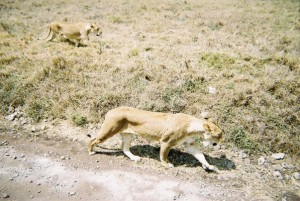
Lioness on the prowl
After lunch we got lucky a second time and rediscovered the lionesses. Whilst we had been eating lunch they were busy hunting and had bagged two zebra. Two male lions had been called over by their prides to enjoy the meal. There were spotted hyena and jackals hanging out nearby, all hoping to get first pickings of whatever remains the lions left behind.
Whilst we were taking it in turns with the binoculars to observe the lions eating, we suddenly discovered that one of the lionesses was stealthily making her way towards us. She walked immediately past the front of the jeep and towards a herd of Zebra. Although she approached the Zebra very cautiously at first, she was at the disadvantage of not having any cover and a couple of Zebra noticed her and took off. At that point she decided to cut her losses and go in for the kill and started sprinting at the herd. The zebras scattered, splitting half to the left and half to the right in order to avoid the long grass that lay behind them. She continued sprinting at them and managed to corner one of the zebras. It was just her and a single zebra, prevented from retreating any further by the long grass behind. A few tense moments passed as she tried to track the zebra down, then the zebra made a run for it. In what was an extremely narrow escape, the zebra managed to outrun the lioness and returned to its herd unharmed. It was a very close and intensely fought game, and for a fleeting moment I thought the lioness had won.
What an amazing spectacle that had just been played out before our eyes! It was almost like we were spectators of a magnificent performance, each providing commentary on the events that unravelled on both sides of the vehicle; the lioness hunting zebra on the one side and the lions having their lunch on the other. A second lioness walked over to see if she could assist in the hunt as the game played out, but to no avail. There were further attempts by the lionesses but no one managed to get close enough. The alarm had already been raised and the surrounding animals were ready and alert to their predator’s presence. We moved on.
Later we managed to spot two sleeping cheetah in the distance. It was a bit of strain to see them even with the binoculars, but sufficient enough for us to tick them off the list in the guide book. Unfortunately the conditions worked against our chances of sighting any Black Rhino, the rarest of the Big Five, and we didn’t manage to find any. However, over the last three days we have set eyes on four of the Big Five; Buffalo, Elephant, Leopard and Lion, which leaves me feeling more than content with the journey so far.
In the late afternoon we left the crater from the eastern side of the rim to stop at a traditional Massai village on the way to the Sopa Lodge. When we pulled up outside the village the chief came out and we each paid $15 for the privilege of being welcomed into the village and to take photos. It was an extra expense that I hadn’t anticipated, but it was worth it. A massai who was very fluent in English (most of the villagers only speak Maa) took us to the village entrance where the entire village (plus neighbours from the next village along) gathered to perform a welcome dance for us. The women lined up in front of us and the men formed a circle, taking it in turns to jump up and down in the middle of the circle. The women sang whilst the men made strange noises from the back of their throats. It was a truly spectacular experience. After they had finished singing to us the chief thanked the villagers and our guide started walking us around the village.

The Maasai welcome dance
At this point I should probably explain what exactly constitutes a Maasai village. Most of the villages are laid out in a similar circular format; this one has a wall made of sticks around the perimeter. There is another inner circle inside that is used to keep the cattle locked up at night. Around the wall of the inner circle is a plentiful display of traditional handcraft Maasai jewellery and weaponry on sale (I so wish I could bring a maasai machete home, but somehow I don’t think customs would allow it). Between the inner circle and the perimeter are small, circular huts where the villagers sleep. I learned that there are 13 huts, 13 being significant because that is the number of wives that the chief has. The huts are made of dung with thatched roofing and are about shoulder height. We were invited into one of them and I had to duck down low to fit through the door. Inside it was incredibly dark, hot and smoky. There was a log fire on the go in the centre, two leather beds on which we sat and a small storage room. It was utterly fascinating. We sat there with a mother and her three children for a few minutes until the smoke became unbearable.
We spent a while longer walking around the village, examining the jewellery on display and conversing with our guide. He was very inquisitive chap and asked us just as many questions as we asked him. In particular, he was intrigued by what made us want to come and see his tribe and how we came to hear of the maasai when we were back in England. We also got to see inside the village school – a small wooden hut with a blackboard and a few benches, located just outside the perimeter of the village. The kids were in the middle of a lesson but we were allowed to go in and have a brief look around while the teacher waited outside. It was a very interesting contrast; between the kids of Kunduchi fishing village and the tribal kids of the north.

Evidently much more interested in us than the camera
After we thanked our guide and the chief we said our goodbyes and departed from the village. Dennis then drove us to our lodge for the night, just a few miles away on the edge of the crater rim. The Ngorongoro Sopa Lodge was very nice, consisting of a large building for the reception and dining hall, an outside pool and sitting area directly overlooking the crater and several lots of round buildings. Our lodge was half way down a long path and had all the trappings of a large luxury hotel room. After ditching our bags we sat outside admiring the view and discussing the day’s events, tucking in to the complementary pastries and coffee that were on offer. After dark we went back to the lodge for a quick shower before dinner.
Dinner was a very nice four-course buffet (including banana soup!) served in a lavish dining hall with all the requisite African trappings to evoke an authentic atmosphere, albeit slightly overcast by the overweight mzungus helping themselves to second and third portions. Half way through our dinner a traditional African choir was paraded around the hall to sing few uplifting songs while we were eating. It certainly added to the authentic atmosphere the hotel was trying to create.
After dinner we were escorted by an askari (security guard) down the path towards our lodge. Before we went back to the lodge however he asked if we would like to come with him to see a Buffalo. He walked us around the other side of the hotel where a Buffalo was grazing on the grass just a few metres in front of someone’s lodge. He told us that if we walked across the grass bank that we were standing in front of, the Buffalo would charge and most likely kill by puncturing the stomach with its horns and trampling its victim to death. I also learned from the askari that two maasai were killed by a buffalo in the area last week; just another reminder of the kind of place we are staying in. Needless to say, I do not feel in any immediate danger tucked up in our brick lodge – not quite the exposure of our tented lodge by Lake Manyara last night.
Tomorrow morning we set off early for a brief visit to world-famous archaeological site, the Oldupai gorge, before making the long journey back to Kilimanjaro Airport where we fly out to Zanzibar Island in the late afternoon. So that pretty much brings us to the end of the safari and I feel three days has been just the right amount of time to experience the northern circuit. I am looking forward to seeing Oldupai tomorrow, and then it’s off to Zanzibar for a further 3 days of sun, sea and paradise. Our journey is nowhere near over yet!


